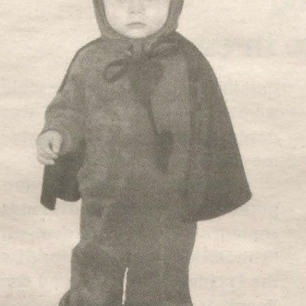
Halloween is upon us. Of all the major holidays, perhaps none generates quite as much controversy as Halloween. It is by its very nature a night of transgression and subversiveness, and this often puts it at odds with the ever changing values that order our society. Gazette writers have addressed these conflicts on many occasions over the years, harkening back to Halloween’s origins in efforts to explain and sometimes even defend the spirit of season.
“The Compliments of the Season” – Volume 8, Issue 10 — April 1, 1876
It is noteworthy how in the observance of days, the merely ludicrous appendages of the ceremonies have outlived the portions that are really commemorative. Hallowmas is forgotten. Burns tells us that in his age and country Hallowe’en was a favourite season with youth for the practice of certain oracular games in order to obtain information respecting their matrimonial prospects. In our country it is called Cabbage Night, from the fact that it is specially consecrated to the abduction of that vegetable from gardens whose owners have forgotten what day it is, and neglected to store their crop.
“Old Nick Walks Of All Saints’ in Ancient Customs Eve” – Volume 84, Issue 9 – October 30, 1951
Tomorrow being Hallowe’en, it would seem high time to remind our gate-filching, cows-on-the-roof friends (couId they be students? Never!) that they are not nearly as clever as they like to imagine, but are actually possessed by evil spirits!
Yes, in the good old days the last night of October was supposedly the one evening in the year when all spirits, good and bad, could wander the earth to their heart’s content. The good little ghosts are rarely mentioned, they just went back to their old homes and got something earthly to eat, but the evil ‘uns!!! They roamed the skies, byways and highways in the form of black cats, vampires, werewolves, witches, and what have you.
With the coming of Christianity, the fateful 31st became known as Hallowe’en, the eve of All Saints Day, but the essential character of the night remained, in fact in some parts of Ireland the eve of November is called “Oidche Shamhna”, vigil of Saman, the lord of death, to this day. In general, however, Satan became Master of Ceremonies in A.D.
The Black Mass evolved as the most gruesome event of the evening. This was a parody of the Christian Mass, celebrated by the Devil himself and followed by will revelling until dawn.
The evil spirits were presumably afraid of fire, hence the custom of lighting huge bonfires. As for apple-bobbing and such like, that came into being after the Roman Conquest of Britain. The feast of Pomona, goddess of fruit trees was celebrated on November 1st, therefore the Romans simply combined that holiday with Hallowe’en.
Maybe if more pranksters knew in whose footsteps they were following on October 31, there would be less chaos come morning. On the other hand perhaps the maligned ones really are possessed by demons. What a ghastly thought!
November 8, 1961
“A SUB Hallowe’en” – Volume 115, Issue 9 – November 4, 1982
To the Editor: Unfortunately something has gone astray with the tradition of Hallowe’en this year. On accompanying a young brother of my friend, I noticed two distinct features this year.
- I) Kids: There was only a token force of them as compared to previous years.
2) About 1 in 4 houses didn’t participate in Hallowe’en in any form (treats, jack-o-lanterns).
Why? Obviously the recent scares of tampered products and candies have many parents scared as hell for the safety of their children. Halifax is not exempt; reports of 3 cases of tampered candy have surfaced.
What can the Dal community do to help remedy the situation? One answer can be to use portions of the SUB building to hold a supervised party for the kids. A single fee could be charged, if any at all, for costs.
Various student organizations could get together and plan such an event, but why bother? Basically, to put the fun back into Hallowe’en for the kids but also to give the Student Organizations of this city a chance to show they care and want to help and gain some badly needed recognition and respect from the community. Also the personal satisfaction that one feels when they stop to help a child. ·
I wouldn’t be writing this letter if a certain incident that I witnessed on a street corner Monday didn’t happen. A little girl tearfully explained to her friends why her parents wouldn’t let her go trick or treating. It makes me wonder how many more little girls are around this city in the same situation. I think maybe the Dal community should consider helping some of those unhappy children next year and give them a place to have fun with their friends in safety and protection!
Someone who cares,
Robert Lavoie
“Editorial” – Catherine Cooper – Volume 137, Issue 8 – October 28, 2004
This year Halloween falls on a day of the week that has received a lot of attention lately. As in 1999, the last time that Oct. 31 fell on a Sunday, there has been pressure from some religious groups to change the date of Halloween so that it doesn’t fall on the Sabbath. As a result, some Canadian communities-including Cape Breton Municipality, Pictou and Yarmouth Counties and the District of Argyle-are officially observing Halloween on Saturday this year.
Whether or not it is fair to enforce observance of religious holidays is an issue that has been beaten to death over the past few weeks, so I won’t even mention the fact that Jews and Seventh Day Adventists observe the Sabbath on Saturday and therefore might not appreciate having this apparently satanic holiday dumped on them. The problem that I have with this changing the day of Halloween business is that it makes no sense in terms of the meaning or history of the day.
On Oct. 27, the Herald quoted Rev. Raymod Fancy of Amherst as saying: ”I’m sure your Bible is the same as my Bible and mine says to honour the Sabbath and keep it holy.”
Members of the Lewisporte, Nfld., council that unanimously voted for a Saturday Halloween this year are quoted as stating “devil’s night and the Lord’s day should not be mixed.” But our account of the history of Halloween reveals it to be a day for celebrating saints and souls rather than devils and ghouls. The tradition of wearing scary costumes on Halloween is actually believed to have been created to ward off evil spirits trying to enter human bodies. And although Halloween is originally a Pagan tradition, it was mixed with Christian tradition after the eighth century and is named as the eve of a day honoring “hallowed” or revered Christian saints. So even from a purely Christian perspective, changing the day of Halloween just doesn’t make any sense.
In the town that I’m from, the swings were chained up on Sundays. You were not supposed to mow your lawn or hang your washing. In return, you were protected from the wrath of God and avoided being ostracized by the other members of the community. My mother likes to tell this story as an example of how backward that place was.
It makes sense that Christians want to reserve Sundays for rest, but trying to arrange it so that kids, Christian or not, can’t trick or treat on the Sabbath seems pretty similar to the ridiculous Sunday restrictions of my hometown. And in any case, changing Halloween to Saturday is counterproductive, because kids can just go to the next town on Sunday and have two Halloweens rather than one.
(…)
Trying to police a fun and harmless event like Halloween just seems silly, not to mention unfair. I suggest that Christians who are worried about the Lord’s Day being misspent by kids getting dressed up and having fun on Sunday should start a new Halloween tradition based on the Christian rather than the Pagan roots of Halloween. So stock up on non-perishable food items and support a local charity-but leave out the part about prayers for the departed-and have a Holy Halloween.








